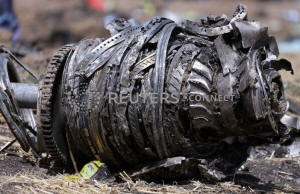|
Ethiopian crash captain untrained on 737
MAX simulator: source
 Send a link to a friend
Send a link to a friend
 [March 21, 2019]
By Maggie Fick and Jason Neely [March 21, 2019]
By Maggie Fick and Jason Neely
ADDIS ABABA (Reuters) - The captain of a doomed
Ethiopian Airlines flight did not practise on a new simulator for the
Boeing 737 MAX 8 before he died in a crash with 157 others, a pilot
colleague said.
Yared Getachew, 29, was due for refresher training at the end of March,
his colleague told Reuters, two months after Ethiopian Airlines had
received one of the first such simulators being distributed.
The March 10 disaster, following another MAX 8 crash in Indonesia in
October, has set off one of the biggest inquiries in aviation history,
focused on the safety of a new automated system and whether crews
understood it properly.
In both cases, the pilots lost control soon after take-off and fought a
losing battle to stop their jets plunging down.
The MAX, which came into service two years ago, has a new automated
system called MCAS (Maneuvering Characteristics Augmentation System). It
is meant to prevent loss of lift which can cause an aerodynamic stall
sending the plane downwards in an uncontrolled way.

"Boeing did not send manuals on MCAS," the Ethiopian Airlines pilot told
Reuters in a hotel lobby, declining to give his name as staff have been
told not to speak in public.
"Actually we know more about the MCAS system from the media than from
Boeing."
Under unprecedented scrutiny and with its MAX fleet grounded worldwide,
the world's largest planemaker has said airlines were given guidance on
how to respond to the activation of MCAS software. It is also promising
a swift update to the system.
TRAINING QUESTIONS
Globally, most commercial airline pilots refresh training in simulators
every six months. In the Ethiopian crash, it was not clear if Yared's
colleague - First Officer Ahmednur Mohammed, 25, who also died in the
crash - had practiced on the new MAX simulator.
It was also not clear if Yared or Ahmednur would have been trained on
that simulator or an older one for 737s that their airline also owned.

Ethiopian Airlines declined to comment on the remarks of its pilot to
Reuters.
[to top of second column]
|

Airplane engine parts are seen at the scene of the Ethiopian
Airlines Flight ET 302 plane crash, near the town of Bishoftu,
southeast of Addis Ababa, Ethiopia March 11, 2019. REUTERS/Tiksa
Negeri/File Photo

"I think that the differences between the 737 NG and the MAX were
underplayed by Boeing," said John Cox, an aviation safety
consultant, former U.S. Airways pilot and former air safety chairman
of the U.S. Airline Pilots Association.
"Consequently the simulator manufacturers were not pushing it
either. The operators didn't realize the magnitude of the
differences," he told Reuters in a communication over the Ethiopian
pilot's remarks.
The 737 MAX 8 was introduced into commercial service in 2017, but
pilots of older 737s were only required to have computer-based
training to switch, according to Boeing, airlines, unions and
regulators.
By December, two months after the Lion Air crash that killed 189
people off Jakarta, the main simulator producer CAE Inc of Canada
said it had delivered just four MAX simulators to airlines.
At that time, CAE had orders from airlines globally for 30 MAX
simulators, which cost between $6 million and $15 million each
depending on customization.
Now CAE has orders for 40 MAX simulators, a spokesman for the
Canadian manufacturer told Reuters this week.

The world's largest 737 operator, Southwest Airlines Co, will not
have its first MAX simulator ready for use until October, its pilot
union said on Wednesday.
"It is still very disturbing to us that Boeing did not disclose MCAS
to the operators and pilots," the association told members in a memo
seen by Reuters.
(Additional reporting by Allison Lampert in Montreal and Tracy
Rucinski in Chicago; Writing by Jamie Freed and Katharine Houreld;
Editing by Andrew Cawthorne)
[© 2019 Thomson Reuters. All rights
reserved.]
Copyright 2019 Reuters. All rights reserved. This material may not be published,
broadcast, rewritten or redistributed.
Thompson Reuters is solely responsible for this content. |